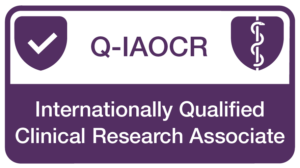Clinical research is the fastest growing industry in the world worth US$ 49.8 billion in 2022 which is estimated to reach a staggering US$ 84.43 billion by 2030 (ref. Global Newswire). And yet over the past five years the FDA has reported a failure rate of 36% in clinical trial site inspections. The reasons for the failures were detailed in the 2021 FDA Report:
- Failure to follow the investigational plan (51%)
- Protocol deviations
- Inadequate record keeping
- Inadequate accountability for investigational product
- Inadequate subject protection – (including informed consent issues)
It has been noted that after the pandemic, the demand for more trials and the subsequent urgent need for staff is a global issue, all whilst the global spotlight has moved onto clinical trials with an increased expectation from the public for professional competence. Given the decentralisation of clinical trials, there is a new complexity on trial protocols and the focus on regulations and guidelines required to manage clinical trial activity have increased.
Clinical Research is such a highly regulated industry however consistent global standards for providing training to ensure an appropriate level of qualification and professional competence do not exist and are not even required – does this mean we are putting patient safety & data integrity at risk?
Key factors are impacting the professionalization of our Industry:
- 40% of Global Workforce considered leaving employer post the pandemic (Microsoft 2021)
- Training does not always equal competence, nor does length of tenure. To have real value, training needs to be, and assessed on, competency. Verifying an individual has the knowledge, skills and behaviours to carry out their work credibly and safely.
- Employer Critical Risk Management Strategy: Confident in professionalism, capability & integrity of employees
But the solution is arguably very straight forward:
- Call to change: More than ever focus on how do we attract, develop and retain great talent
- Competency based training, assessment and verification: Aligned with global core competency frameworks and best practice standards
- Competency based recruitment: Easily identify skills gaps; avoid unnecessary training costs for already competency verified professionals.
- Lack of Harmonisation: Clinical research training cannot be an “add-on,” – it needs to be recognised as a profession with clear career development pathways and award of professional recognition
- Concept of SQEEP: Suitably qualified experienced and empowered people
We are striving for an engaged, motivated, competent, valued, respected & recognised – high performing workforce.
How do we achieve this?

IAOCR’s Workforce Quality Accreditation (WQA)
The Clinical Research Workforce Quality Accreditation was developed in collaboration with industry experts in response to demand from CROs and pharmaceutical companies. Awarded at the organizational level, IAOCR Workforce Quality Accreditation provides independent internationally-recognised standards to varying levels:

For competency verification, quality assurance and professional recognition awarded at the individual level, explore our range of internationally recognised foundation, ICH-GCP and career pathway accreditations here.
Reasons for change are compelling, not making a change is even stronger
- What are we doing to recruit and train staff to ensure competence at our clinical trial sites?
- What is the impact of competency gaps on the patients, the data, the workforce and the reputation of your organisation?
- What are we doing to attract and retain high quality industry talent?
Barriers: Time and Money, “We have always done it like this”
Change: Shift the mind-set – “Why are we not doing it?”










